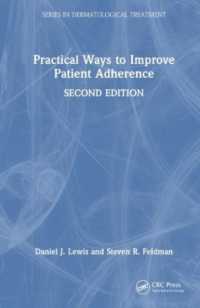Full Description
Language, both spoken and written, is key to understanding learning processes in the classroom. Research Methods for Classroom Discourse is for those who want to investigate spoken interaction or other discourse in the classroom. It lays out clearly the different approaches which are possible, identifying the key principles of each. It addresses the differences between them and the consequences these differences might have for teachers and researchers. Each approach is outlined in terms of practical methods advice, reasons for use, and case studies in which the approach has been used in classroom discourse.
Common approaches such as conversation analysis, positioning theory, and critical discourse analysis are included alongside more specialised approaches such as discursive psychology and corpus linguistics. The context of classroom research is used to frame all discussions, with connections to other uses and applications where it can enhance the research being undertaken. The authors demonstrate the relationship between these different theoretical approaches through considering particular applications to common topics within classroom research, such as multilingual learners, knowledge/ knowing and identity. The authors assume no prior knowledge of technical terms and a glossary of key term terms is included. Practical issues such as ethics, data collection and transcription are an integral part of the discussion throughout, providing students with all the knowledge needed to embark upon a successful research project in this area.
Contents
Introduction
Part I: Theoretical Frameworks
1. Conversation Analysis and Discursive Psychology
2. Positioning Theory
3. Thematic Analysis and Critical Discourse Analysis
4. Sociolinguistics
5. Corpus Linguistics
Part II: Applications
6. Identity
7. Multilingual Learners
8. Knowledge and Knowing
9. Written Texts
Part III: Practical Considerations
10. Ethics
11. Data Collection
12. Transcription Decisions
Glossary of Terms
Bibliography
Index






